Culture is more boom than bust in Spain with
a flurry of exciting new and revamped museums opening nationwide.
For lovers of museums, Spain is surely one
of the world’s happiest hunting- grounds. The range is enormous: the Ministry
of Culture can only estimate that there are ‘more than a thousand’ museums
nationwide. Even the sleepiest Spanish provincial town has at least one, often
devoted to a local product or the birthplace of a local worthy; the province of
Madrid alone has 132.
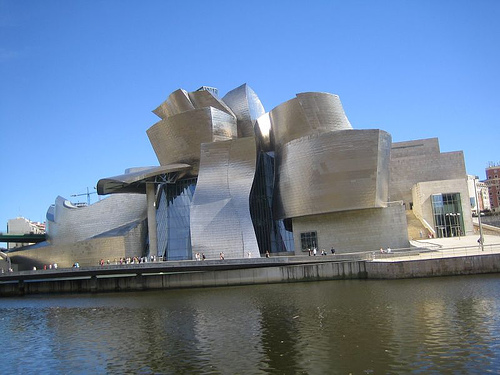
The
Guggenheim Museum Bilbao
And the good news, for those of us who
regard mooching around museums as an essential element of world travel, is that
this is a boom- time for such institutions in Spain. The fever of museum-
building is not easy to explain but its origins clearly lie in the pre- crisis
era, when both state and regional governments had money to spend on culture,
and in the tourism magnet of the Guggenheim Museum Bilbao.
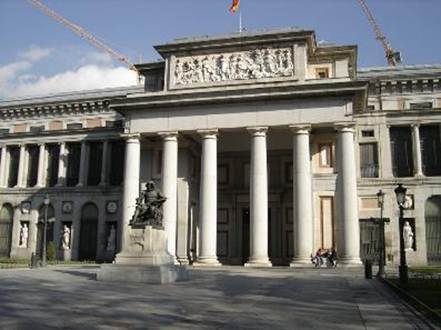
The
Royal Collections Museum in Madrid
The newest crop falls into two main
categories: architectural makeovers of existing institutions and buildings, and
newly created entities in new buildings. Among the dozen or more that opened
last year are museums of art, science, history, archaeology, energy, ideas and
the army. Among those still keenly awaited is the Royal Collections Museum in
Madrid, the work of architects Mansilla + Tunon, whose multicolored Music in
Leon was described by The New York Times in 2006 as ‘one of the most
astonishingly bold museums to hit the Spanish cultural landscape in years’.
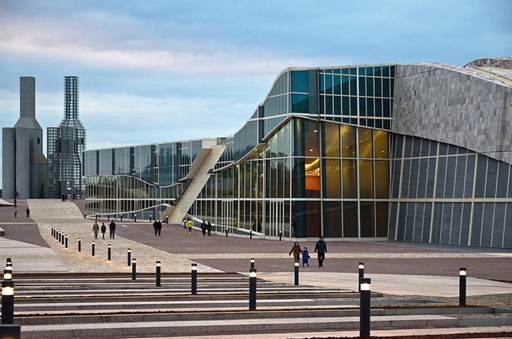
View
of the City of Culture of Galicia, at Santiago de Compostela, Spain
The most stimulating of them are not
necessarily the grandest: the new Cidade da Culture de Galicia in Santiago de
Compostela, for example, is widely regarded as a colossal white elephant, while
smaller projects including the Helga de Alvear gallery in Caceres and the
Antoni Tapies Foundation in Barcelona (splendidly remodeled in 2010) are
absolutely worth the detour. An example of modest aims and transcendent results
is the Museo San Telmo in San Sebastian, a city museum whose new incarnation
brings clarity to much that was mysterious about Basque history- and also
brilliantly integrates a church and cloister into thw whole. Some things never
change, however. Museums in Spain, even the newest ones, are closed on Mondays.
La Coruna: National museum of science and technology
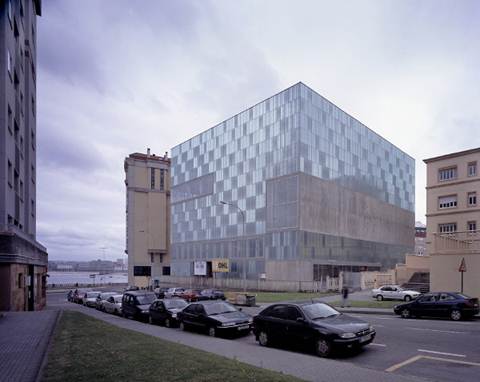
National
Museum of Science and Technology, La Coruna
This building was a triumph long before it
had anything inside it. The ‘crystal prism’ is a light- flooded glass box six
stores high designed by Victoria Acebo and Angel Alonso, admired both
nationally and internationally (the project was elven shown at MoMA in new
York). Opening shortly to the public, it will form the headquarters of the
Museo Nacional de Ciencia y Technologic (MUNCYT), previously located in a
cramped former railway station in Madrid.
The MUNCYT is born of the lofty principle
that- as a sign in the lobby reads- there is no culture without science, but
also no science without culture. The most arresting of the exhibits is the
front section of a Boeing 747, 12 meters high and seven wide: visitors are
encouraged to poke about inside it. But there is plenty more worth peering at,
and pondering: the first car top emerge from an assembly line in 1920s Europe
(a Citroen), the first computer to arrive in Spain (it had just one kilobyte of
memory), and the first electric light in the Rower of Hercules, the famous
lighthouse off La Coruna (A Coruna in Galician). The exhibition, spread over a
total of 6,660 square meters, is lucidly displayed according to a series of
themes, the idea being to show a small section of the total collection of
15,000 objects at any one time.
For La Coruna, an under visited city on the
wild north- west coats of Spain, the new museum is the object of justifiable
pride. It is Galicia’s first national museum (the result of a decentralisation
policy that has also bequeathed a national ethnography museum to Reruel and a
national museum of energy to Leon) and Spain’s first major attempt to place a
value on, and feel good about, its own technological heritage.
Plaza del Museo Nacional 1 (00 34 900
100 134; ww.muncyt.es). Opening times to be confirmed.
Getaria: Cristobal Balenciaga Museum
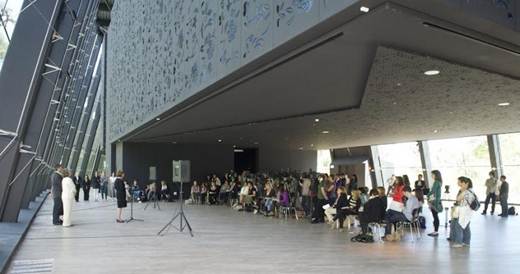
The
Cristobal Balenciaga Museum in Getaria, Spain
Here, even those with no time for fashion’s
fripperies are forced to acknowledge the greatness pf Cristobal Balenciaga,
Spain’s most influential designer. He was born in 1895 in Getaria, a fishing
town along the coast from San Sebastian. The hulking black form of the museum
devoted to his life and work, designed by Cuban architects Julian Argilagos and
Rolando Paciel and set on a hill above the town with views of the sea, opened
in June 2011 after a tortured 12- year gestation period involving accusation
period involving accusations of malpractice.
The museum’s main theme is the extraordinary
modernity of Balenciaga’s designs, whose formal sobriety and technical
brilliance led Hubert de Givenchy to call him ‘the architect of haute couture’.
The collection is divided into day, cocktail and evening wear, bridal gowns and
a ‘greatest hits’ selection of Balenciaga masterpieces. The worlds (one
hesitates to call them ‘dresses’) are strikingly displayed and in perfect
condition, though they are rather dimly lit.
You do not have to be a student of fashion
history to understand the importance of Balenciada. His later creations with
grandiose theatrical shapes, are works of art. Christian Dior famously declared
that ‘with fabric, we do what we can’ balenciaga does what he wants’. The
Critobal Balenciada Museum has been worth the wait: it vindicates a great
Basque and Spanish creator and one of fashion’s universal geniuses.
Aldamar Parkea 6 (00 34 943 008 840;
www.critobalbalenciagamuseoa.com) . Open tues- Thurs, 10.30am- 5pm; Fri/Sat,
10am- 8pm; Sundays and public holidays 10.30am- 6pm. Entrance fee $12
(concessions $7.6)